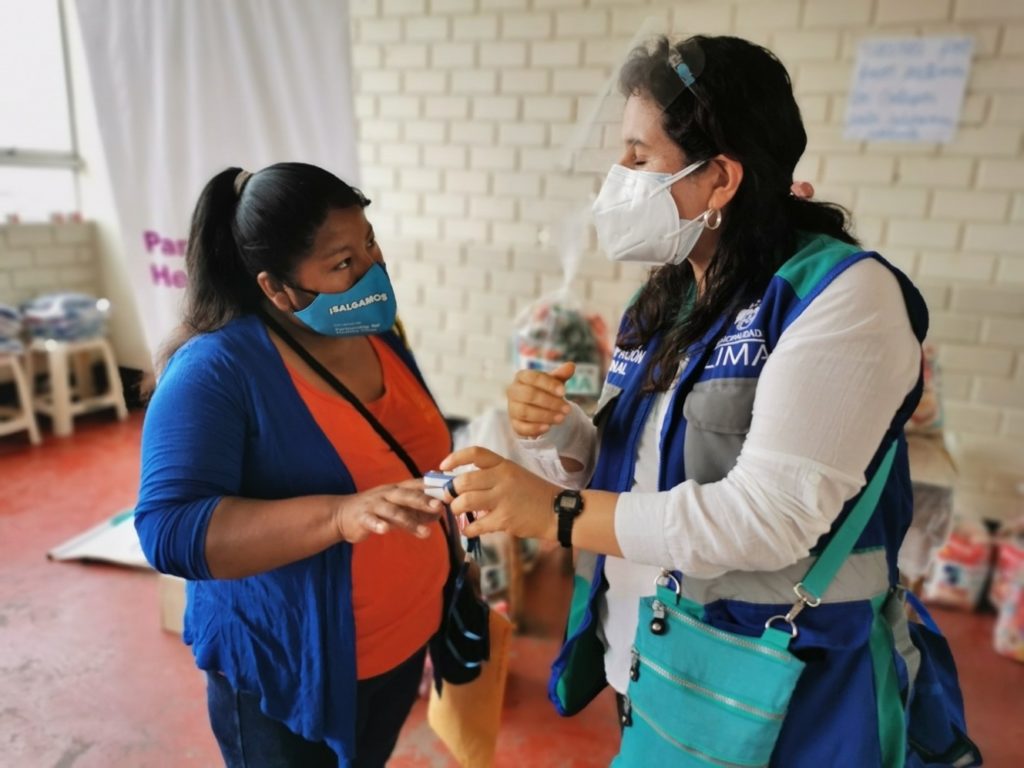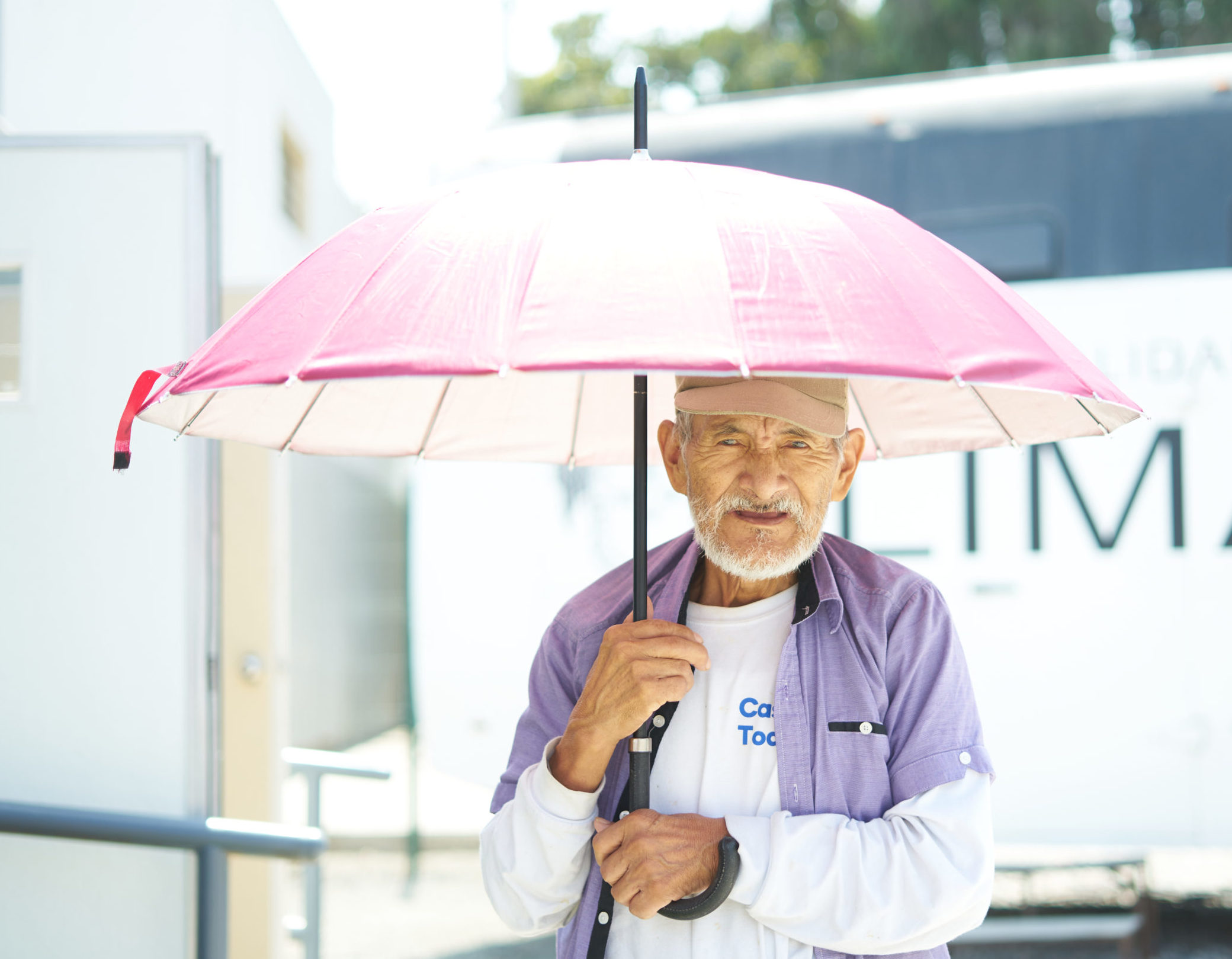From the onset of the pandemic, Peru’s experience with COVID-19 was extreme. Infection rates rose early and have remained high alongside continuous shortages of tests, oxygen and now vaccines. In June 2021, the country reported possibly the highest COVID-19 death rates in the world.
Adults over 60 have been by far the most affected in Peru, and as the pandemic tore through the capital city of Lima, it became clear that unhoused older adults in particular needed an emergency solution. On top of the risk of being exposed to COVID-19 without the protections of shelter and clean water—and older adults’ higher rates of serious illness and death from the coronavirus—the pandemic eliminated many of the informal sector jobs that had previously allowed unhoused adults to survive on the streets.

That is how José Luis Barreto, Juan Carlos Alfaro García and dozens of other men found themselves at Casa de Todos, or “Everybody’s House,” an emergency shelter set up in 2020 by Beneficencia de Lima in collaboration with the Municipality of Lima and supported by the Partnership for Healthy Cities and Resolve to Save Lives, an initiative of Vital Strategies. The lives of these men, already unstable, had been upended by the COVID-19 crisis: Barreto could no longer find takers for the trash he collected for recycling, and Alfaro García was unable to find work cleaning cars.
At Casa de Todos—at first just a series of tents pitched in a bullfighting ring—they found a bed, food, counseling, personal care amenities such as haircuts, group activities like gardening, music, chess—and health care. A high proportion of residents arrived with chronic conditions including hypertension, diabetes, tuberculosis or HIV, in many cases untreated until their arrival at Casa de Todos. With the help of Casa de Todos, many residents have since been able to obtain identity documents that now provide them with national health insurance. This is not to mention the psychological benefits of being able to socialize safely and stop worrying about the next meal. By April 2021, Casa de Todos had served a total of 184 men.
Residents of the shelter benefited immediately, but the project has afforded longer-term changes too. Within a matter of months, 16 Casa de Todos residents had moved in with family members, some reconnecting for the first time in years—Barreto (pictured above) with his children, and Alfaro García with a cousin.
As successes mounted over the past 15 months, Case de Todos officially became a permanent shelter, with remaining residents moving to a building downtown where they were promised long-term housing and support—even when the pandemic is over.

Recognizing the critical need to protect Lima’s older adults from COVID-19 infection, the city has also made this population a focus of its ongoing vaccine rollout. A new Partnership-supported communication campaign launching soon will target the city’s 1.1 million older adults (among a total of 7.4 million adults) to strengthen and maintain confidence in the inoculations.
Messages about why and how to get a vaccine will be delivered through an existing citywide network catering to the needs of Lima’s older residents. They will also be shared individually through one-on-one conversations conducted by community health brigades that are led by neighbors trained to do outreach in their own communities. Mass vaccination sites are being complemented by community-based pop-up events.
The Partnership for Healthy Cities has provided a range of support to Lima throughout the pandemic, including:
- Purchasing 11,000 antigen tests.
- Purchasing equipment and supplies for 181 health screening events throughout the city, including food baskets, masks and oximeters for those testing positive.
- Technical assistance for reopening protocols.
- Funding the “Lima Takes Care of You” communication campaigns that encourage people to get tested and to protect themselves and others by wearing masks, practicing physical distancing and washing their hands.
- Resources to sustain contact tracing and health evaluations conducted by phone.
- Technical support for development of a dashboard for use by the city’s Social Development Department. Updated weekly, the dashboard includes health and housing indicators for older adults.
The pandemic persists in Lima, as in the rest of Peru, but the city’s comprehensive COVID-19 strategy has caught the attention of other urban areas in Latin America. In recent weeks, public health officials in Lima have met virtually with representatives of both Quito, Ecuador and Montevideo, Uruguay to share successes on issues like contact-tracing and data monitoring and sharing. The hope is that these Partnership for Healthy Cities exchanges showcase urban public health strategies that will inform cities’ work in the future, while also strengthening regional communication.

Learn more about the Partnership for Healthy Cities COVID-19 Response Center: https://cities4health.org/
Follow us on Twitter: @VitalStrat
About the Partnership for Healthy Cities:
The Partnership for Healthy Cities is a prestigious global network of cities committed to saving lives by preventing noncommunicable diseases (NCDs) and injuries. Supported by Bloomberg Philanthropies in partnership with WHO, as well as Vital Strategies, this initiative enables cities around the world to deliver a high-impact policy or programmatic intervention to reduce NCDs and injuries in their communities. For more information, visit: https://partnershipforhealthycities.bloomberg.org/
The Partnership for Healthy Cities COVID-19 Response is part of the $40 million Bloomberg Philanthropies COVID-19 Global Response Initiative. By collaborating with the WHO and Resolve to Save Lives, an initiative of Vital Strategies, the Partnership for Healthy Cities COVID-19 Response is working hand-in-hand with the world’s leading experts on epidemic prevention.
